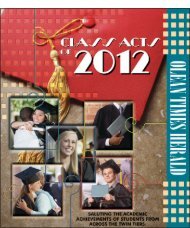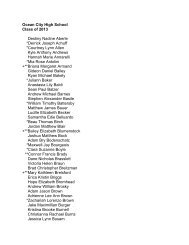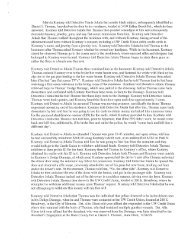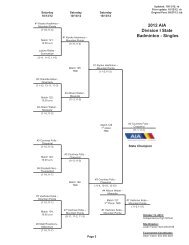1 IN THE IOWA DISTRICT COURT FOR DES ... - TownNews.com
1 IN THE IOWA DISTRICT COURT FOR DES ... - TownNews.com
1 IN THE IOWA DISTRICT COURT FOR DES ... - TownNews.com
You also want an ePaper? Increase the reach of your titles
YUMPU automatically turns print PDFs into web optimized ePapers that Google loves.
4. When the State filed its Answer, it did not assert a statute of limitations<br />
defense. This defense was first raised in a Motion For Summary Judgment filed<br />
February 22, 2010. At the time, there was considerable confusion about the particular<br />
grounds for relief alleged by McGhee. This Court is not certain the precise grounds for<br />
relief have since been more definitively identified, with the possible exception of the<br />
allegation relating to the alleged failure to disclose exculpatory evidence. Nevertheless,<br />
it is clear that McGhee claims his trial counsel was ineffective. This Court chooses to<br />
decide McGhee’s claims on the merits.<br />
A. WHE<strong>THE</strong>R TRIAL COUNSEL WAS <strong>IN</strong>EFFECTIVE<br />
1. Principles Of Ineffective Assistance Of Counsel<br />
The principles relating to ineffective assistance of counsel are well established.<br />
To prevail on an ineffective-assistance-of-counsel claim, a defendant must show: “(1)<br />
counsel failed to perform an essential duty; and (2) prejudice resulted.” State v.<br />
Maxwell, 743 N.W. 2d 185, 195 (Iowa 2008). Proof of the first prong of this claim<br />
requires a showing that counsel’s performance fell outside the normal range of<br />
<strong>com</strong>petency. “Trial counsel’s performance is measured objectively by determining<br />
whether counsel’s assistance was reasonable, under prevailing professional norms,<br />
considering all the circumstances.” State v. Vance, 790 N.W. 2d 775, 785 (Iowa 2010)<br />
(quoting State v. Lyman, 776 N.W. 2d 865, 878 (Iowa 2010)).<br />
Proof of the second prong requires a showing by the applicant of a reasonable<br />
probability that, but for counsel’s unprofessional errors, the results of the proceeding<br />
would have been different. State v. Artzer, 609 N.W. 2d 526, 531 (Iowa 2000). “In<br />
determining whether this standard has been met, the Court must consider the totality of<br />
8
















